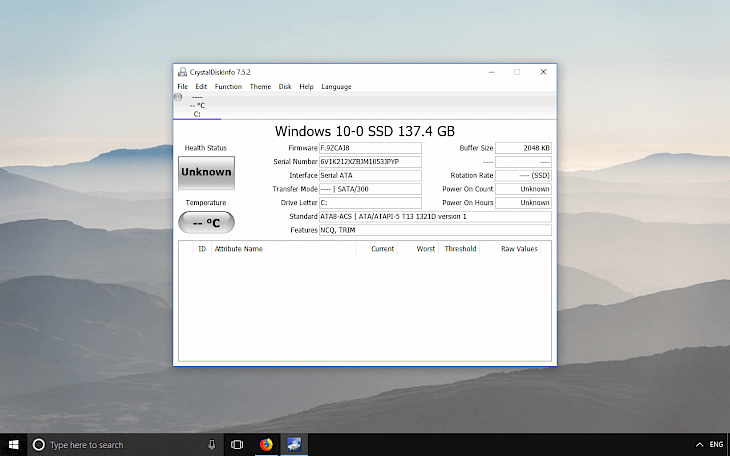
- #SSD HEALTH CHECK CRYSTALDISKINFO HOW TO#
- #SSD HEALTH CHECK CRYSTALDISKINFO INSTALL#
- #SSD HEALTH CHECK CRYSTALDISKINFO OFFLINE#
- #SSD HEALTH CHECK CRYSTALDISKINFO WINDOWS#
TBW is distributed throughout the lifetime guarantee of the drive, which is commonly specified in multiple single-digit years, frequently 3 or 5.

This is because most SSDs have a capacity of 75 to 150 TBW.Īt that time, it is recommended that you replace the drive since the data on it is no longer as secure as it previously was. TBW meaning Terabytes written is a statistic (usually in terabytes) supplied to storage devices that tells you how many terabytes you may write to the drive during its warranty term before the memory cells inside it begin to deteriorate increasing the potential of data loss and drive failure.įor instance, if an SSD has 350 TBW, you may transfer 350TB to it before it needs to be replaced. This article will discover everything you should know about SSD TBW. However, you're at the right spot if you don't know what SSD TBW is and how you can check it. It would help if you also verified the TBW of the SSD before purchasing it. Manufacturers grade their drives based on three main characteristics known as TBW, drive writes per day, and drive capacity (DWPD). They are, however, somewhat costlier for the storage capacity they supply, which is why some customers are hesitant to buy this expensive gear. They are as silent as a mouse, far quicker than HDDs, and less prone to failure.
#SSD HEALTH CHECK CRYSTALDISKINFO HOW TO#
#SSD HEALTH CHECK CRYSTALDISKINFO INSTALL#
I decided to let MS install the 22H2 build.
#SSD HEALTH CHECK CRYSTALDISKINFO WINDOWS#
Windows Server 2022 not shutting down Windows.Never easy to figure those things out, but it can be a good learning experience. Especially when the hardware is 3+ years old it might be smart to start looking around for replacement. Also, if you have a gut feeling that it might go wrong soon, tell them that. They need to understand the risks.īring it in a way that you can express your concerns, hardware lifetime and such included. Most important in this is that they understand that in any event where you have to rely on the backup, you still can loose some work and it at least costs an amount of time to get back up and running. Tell your concerns in the best way you can. Then you write this down (making sure it's an estimate and not hard figures as you never know what comes on your way when this happens) and explain it to management. How much time will you be off-line and what are the costs.

Not only just the recovery, but also when you have to buy new hardware. Guess you have to ask yourself the question how fast you can be up and running again from the backup you have. In both cases you can't access the data anymore. The problem with SSD is that is less likely for the memory chips to die then it is that the controller simply stops working. The problem with harddisks is that they spin around and all kind of things can suddenly go wrong. to be honost, haven't used it much lately. I'm not sure about the Windows error logs. before that Do u think atleast windows error logs will list any kind of warnings or messages related to the disk health
#SSD HEALTH CHECK CRYSTALDISKINFO OFFLINE#
In doubt? Just calculate the costs of replacing the drives or whole unit and put those costs against a day (or more!) of beeing offline due to hardware failures. What kind of drives you use now? Enterprise drives with a 5 year warranty (WD GOLD for example) are more likely to run for 5+ years then a drive with 1 or 2 years warranty and / or not even fit for enterprise use. It didn't matter if the harddisks where a month, a year or several years in use.ĭon't just trust the information you get back from those tools.

In my experience harddisks / SSD's died even when some tools "told" me nothing wrong.


 0 kommentar(er)
0 kommentar(er)
